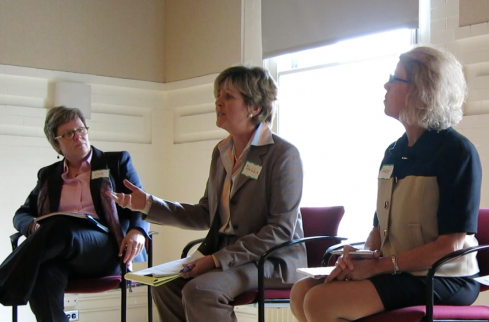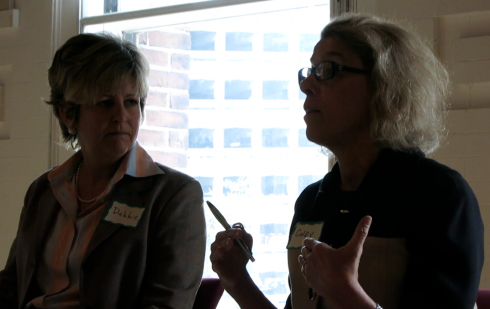Last Tuesday September 10, Chris Connors from the Office for Diversity and Inclusion and Human Resources facilitated a Women in Leadership Panel Discussion at The Loft at Berklee College of Music. The panel brought together three of Berklee’s most prominent leaders, Debbie Cavalier, VP of Online Learning and Continuing Education, Cindy Link, SVP for Institutional Advancement, and Dr. Krystal Banfield, Dean for City Music. The objective of the discussion was to ask the questions “how did you get to where you are in your career?” “how did you overcome obstacles?” and “how can women attain more leadership positions?”
The panelists as well as audience members offered insightful commentary.
One of the themes that stuck out during the discussion was that women have to work substantially harder than men to achieve a certain level of leadership. Dr. Banfield explained a powerful perspective, “As an African American, especially as a female, it’s always been instilled in me that I have to be ten times better – whatever that means. I always have to be prepared; I can never slip up if I’m ever going to have the opportunity for those doors to be opened. I am a torchbearer for all of the women and for all of the women of color. I have to carry that responsibility so that those who follow behind me will have more opportunities.”
Cindy Link commented – although she hopes one day that she will be able to disagree with this statement – “women have to work 40% harder.”
Regardless of the challenges they faced, Cavalier, Link, and Banfield did reach success in their careers. They are distinguished leaders at Berklee who have a following of peers who look up to them. So how did they get to this point? Cavalier shared a personal anecdote:

“Leading the charge on something unpopular was a challenge…Pursuing children’s music was always a passion of mine. I never pursued it until I was about to turn 40. That has made everything in my life better. You have to be true and authentic about the things you are passionate about.”
But you can’t always pursue your passions. Life happens, and as Link puts it, “you have to learn to embrace the process.”
She explains: “There are times when you say ‘I didn’t accomplish anything worth while…I’m devoting my life to this thing and it’s not very important.’ So I think the biggest obstacle is determining what matters to you and being patient if it seems like you’ve hit a hiccup. Never evaluate a job in the first six months. You cannot look around the corner; you have to wait till you get to it. It’s a big mistake to make some decisions prematurely.”
Determining your values, embracing the process, and persevering is only half the battle to becoming a leader. As the three panelists explained, part of being a leader is recognizing other leaders who you work with and allowing them to flourish.
How can we ensure that women are involved in this predominantly male process?

Audience members as well as the panelists agreed that we need to encourage young women to be assertive and take on management positions at the beginning of their educational experience. Considering the fact that students at Berklee come from many cultures with different values and attitudes towards women, it was suggested that there should be programs that teach young women how to be confident leaders.
This idea was extremely well received by audience members. It could have taken the discussion to another level – if time permitted. However, it neglected to point out that Berklee is made up of a predominantly male population that includes cultures where women are not given equal respect.

In order for young women to have the opportunity to attain leadership positions, education and leadership development needs to be geared toward both the male and female students. Leadership development classes should be all- inclusive with an equal emphasis on both men and women. If there will be progress, there needs to be a change in attitude and behavior on both sides.
And we don’t need to wait for the process to start. As Dr. Banfield said, “We are all accountable for what we do; in this way, we are all leaders.”
Latest posts by Joanne Dill (see all)
- Women in Leadership Panel Discussion - September 18, 2013
- Sarah McLachlan School of Music Joins the Berklee City Music Network - August 15, 2013
- Berklee City Music Concert: 17 Scholarships, Over a Hundred Celebrations - August 14, 2013


Leave a Reply